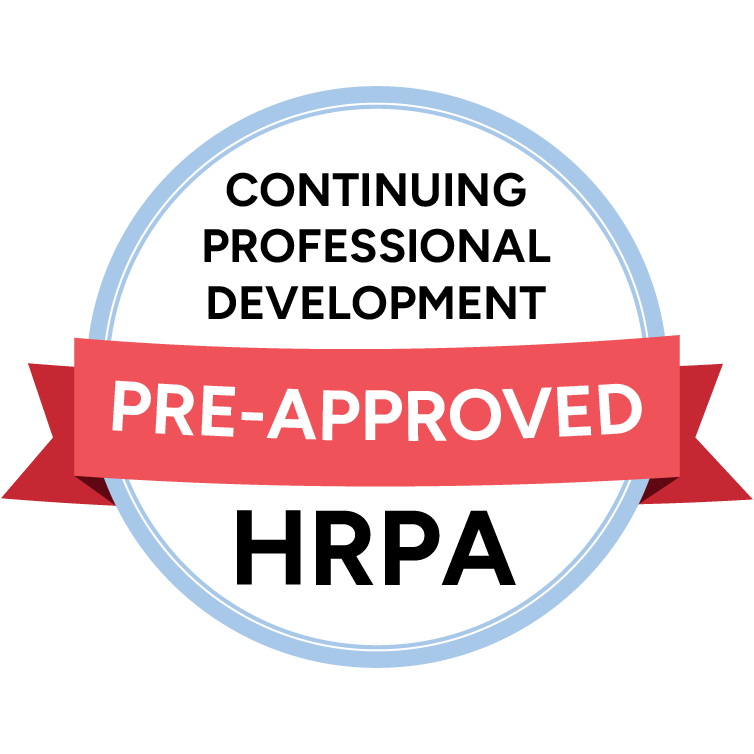Stay Ahead in Employment Law, Workplace Accommodation & Diversity
Join Canada’s premier Human Rights and Accommodation Conference in Toronto and gain expert insights into the latest employment law updates, workplace accommodation training, and diversity & inclusion strategies. Hosted by Lancaster House, the trusted leader in legal education, this event brings together top employment lawyers, HR professionals, business leaders, and policymakers to discuss the most pressing issues in workplace human rights.
What You’ll Learn
At the Toronto Human Rights and Accommodation Conference 2025, you’ll gain actionable insights on:
Human Rights Law Updates – Stay informed on recent tribunal decisions, legislative changes, and legal obligations for employers.
Workplace Accommodation Strategies – Learn how to effectively accommodate employees with disabilities and diverse needs while staying compliant.
Diversity and Inclusion in the Workplace – Discover best practices for fostering equity, inclusion, and anti-discrimination policies.
HR Legal Compliance & Best Practices – Understand your responsibilities in employee rights, workplace fairness, and accessibility requirements.
Real-World Case Studies & Expert Panels – Hear directly from legal experts, HR specialists, and human rights advocates about emerging challenges and solutions.
Who Should Attend?
This conference is essential for:
Employment Lawyers & Legal Professionals – Stay ahead of evolving employment laws and gain insights on key case law decisions.
HR Professionals & Business Leaders – Understand your obligations and responsibilities when implementing workplace accommodations and inclusion strategies.
Diversity, Equity & Inclusion (DEI) Specialists – Learn best practices for fostering an inclusive, discrimination-free workplace.
Union Representatives & Labor Advocates – Get the latest updates on human rights protections and fair labor policies.
Toronto Human Rights and Accommodation Conference – Bundle: Conference + Workshop
$2,695.00Read more
Toronto Human Rights and Accommodation Conference – Pre-Conference Workshop
$1,095.00Read more
Toronto Human Rights and Accommodation Conference – Conference
$2,195.00Read more
Toronto Human Rights and Accommodation Conference – Day 1
$1,395.00Read more
Toronto Human Rights and Accommodation Conference – Day 2
$1,395.00Read more
Why Choose Lancaster House?
Expert-Led Sessions – Learn from Canada’s leading human rights lawyers, policymakers, and HR specialists.
Interactive & Practical Training – Gain real-world, applicable knowledge through case studies, Q&A sessions, and networking opportunities.
Accredited Learning – Earn continuing legal education (CLE) credits while expanding your expertise.
Trusted Legal Publisher – Lancaster House has been a leader in labor, employment, and human rights law education for over 40 years.
Wednesday, April 30, 2025
Breakfast: 8:00 am – 9:00 am ET
Workshop
*Workshop sold separately from stand-alone conference.
Workshop schedule: 9:00 am – 4:00 pm ET
(The schedule will run concurrently for all three workshops until 4:00 pm)
Challenges often arise in accommodating employees with conditions that cannot be identified by a clear diagnostic test or that are not yet well-understood within the medical community. In this session, panelists will examine key principles and best practices for accommodating employees with these conditions.
Speakers will address:
- Examples of common medical conditions that elude diagnosis, or that are considered “diagnoses of exclusion” (including “long COVID”);
- Legal limits on medical information that employers can request from employees;
- How to formulate requests for medical information where an employee’s condition cannot be confirmed using a clinician’s diagnostic test;
- What to do when there are no available medical practitioners with the requisite knowledge or expertise to assess an employee’s condition;
- How to approach, with sensitivity, employees/union members for needed medical information;
- Dealing with stereotypes and stigmas associated with difficult-to-identify medical conditions;
- What types of accommodations will be of assistance to an employee suffering from persistent or chronic symptoms;
- Whether an employer can discipline or dismiss an employee who is frequently absent, underperforming, or exhibiting atypical workplace behaviours but who asserts that it is due to an as-yet undiagnosed disability; and
- Determining when the duty to accommodate is at an end because undue hardship is unavoidable.
During the workshop, participants will engage in interactive exercises, applying principles and practices learned throughout the day.
Thursday, May 1, 2025
Breakfast: 8:00 am – 9:00 am ET
Opening Remarks: 9:00 am – 9:05 am ET
In this session, panelists will delve into the numerous recent and significant developments in workplace human rights, examining key cases and legislative changes. Speakers will discuss the latest cases addressing topics such as:
- trends in discipline and damages for harassment and discrimination and evidentiary challenges in cases of allegations of harassment and discrimination;
- rights and restrictions involving employee expression of personal or political views and beliefs at work;
- trends in discipline and damages for harassment and discrimination;
- accommodating neurodiverse employees;
- privacy, monitoring, and surveillance;
- substance use and testing; and
- conflicts between health and safety obligations and human rights concerns.
The panel will also address recent Ontario and federal legislative initiatives, including:
- recent changes enacted through Ontario’s Working for Workers series of legislation addressing pay transparency, the use of artificial intelligence, harassment in virtual contexts, and more; and
- ongoing obligations for employers under the Ontario and federal Pay Equity Act.
Final selection of topics will take place in the weeks leading up to the conference, ensuring coverage of the latest and most newsworthy developments.
Break: 10:35 am –10:50 am ET
In this session, panelists will examine the response to employee requests for accommodation through remote, hybrid, or other flexible work arrangements. The session will address questions including:
- Do employers have the right to require employees to return to in-person work? What aspects of a general return-to-office are vulnerable to challenge under human rights legislation or on other grounds? How does collective agreement language affect the matter?
- In what circumstances have arbitrators and adjudicators found that employees must be permitted to work from home as a health-related accommodation? Does an employee’s demonstrated or perceived susceptibility to contracting COVID-19 or other illnesses warrant accommodation? Will employees be entitled to work from home during pregnancy or where a spouse or dependent may have increased susceptibility to infection?
- In what circumstances have decision-makers found that employees should be permitted to work from home or on a remote or hybrid basis in order to accommodate obligations related to their family status, such as childcare or eldercare responsibilities? What kinds of information can employers require to support such a request?
- How can employers and unions distinguish an employee’s personal preferences from legitimate accommodation needs?
- When will insisting that an employee return to in-person work amount to a bona fide occupational requirement? When will an employer be able to establish that undue hardship will arise if an employee is allowed to work from home? Is an impact on broader employee morale sufficient to establish undue hardship?
- Is it discriminatory for an employer to impose additional performance monitoring practices on an employee engaged in remote or hybrid work — such as a requirement for regular check-ins, use of timesheets, etc.?
- Beyond legal considerations, what practical considerations should be taken into account when assessing whether an employee should be permitted to work from home? What flexible working options other than remote or hybrid work can be considered? What benefits and drawbacks do remote, hybrid, or flexible working arrangements have for employees requiring accommodation?
- What best practices can employers and unions implement to ensure that employees being accommodated through remote, hybrid, or flexible work do not become isolated from the team?
Lunch: 12:05 pm – 1:00 pm ET
Conducting a workplace investigation into human rights-related allegations is a complex process that requires fairness and a commitment to best practices. This panel will examine recent caselaw addressing workplace investigations with a view to providing guidance in conducting “best practices” investigations. The panel will address a series of questions including:
- What lessons can be learned from recent caselaw as to what constitutes a fair and adequate investigation process?
- What procedural flaws have been found to render an investigation unfair or inadequate — for instance, flaws in timeliness, thoroughness, confidentiality, and reporting?
- What steps should an employer take to address the impact of the human rights allegations? What actions should an employer take to prevent further discrimination?
- Is a formal investigation always required when an employee raises human rights-related concerns? What guidance do the courts and human rights tribunals provide? When might other options, such as alternative dispute resolution, be permissible or preferable?
- When is retaining a third-party investigator necessary?
- What is the role of a union in a workplace human rights investigation? What rights and/or responsibilities do unions have? What should unions do when both the complainant and the respondent are bargaining unit members?
- Can the grounds for an investigation be expanded after the investigation has commenced — for example, if issues of systemic discrimination arise? What are the potential pitfalls of expanding the grounds of an investigation?
- What are best practices for countering unconscious and implicit bias and otherwise ensuring stereotypes and discrimination do not taint the investigatory process?
- How should employers and unions respond when an investigation reveals bad faith allegations by an employee?
- What can the union and employer do to restore a safe and healthy workplace for all parties following an investigation?
Break: 2:15 pm –2:30 pm ET
In this interactive session, panelists will address scenarios based on real cases involving allegations of discrimination, examining legal principles for identifying and addressing subtle and systemic forms of discrimination as well as meeting obligations such as the duty to accommodate. Panelists will address questions such as:
- How have arbitrators and human rights tribunals resolved evidentiary and credibility challenges when determining whether discrimination has occurred?
- What contextual factors have decision-makers considered in determining whether conduct which may seem innocuous on its face is, in fact, a subtle form of discrimination?
- What factors should be considered in determining whether systemic discrimination has adversely impacted an employee?
- What aspects of a hiring or promotion process will render that process more or less vulnerable to challenge as discriminatory?
- How does the test for discrimination differ depending on the ground of discrimination that is alleged? For example, what unique considerations apply when determining whether an employee has been discriminated against on the basis of religion?
- When will a rule or standard that on its face appears to be discriminatory be justified as a bona fide occupational requirement? When will accommodating an employee amount to undue hardship?
- When will employers be held liable for the discriminatory conduct of employees toward other employees in the workplace?
Scenarios will be finalized in the weeks leading up to the conference, ensuring coverage of the most relevant cases.
Closing remarks: 3:55 pm –3:50 pm ET
Friday, May 2, 2025
Breakfast: 8:00 am – 9:00 am ET
Introduction: 9:00 am – 9:05 am ET
In this session, expert panelists will examine legal obligations and best practices in responding effectively and appropriately to harassment and discrimination at work. Panelists will address questions including:
- What legal obligations govern an employer’s response to discrimination and harassment in the workplace? When is the duty to investigate triggered?
- Are employers obligated to impose discipline when employees have committed human rights violations at work? Where discipline is imposed, what types of conduct may warrant more severe consequences? What considerations have arbitrators in recent cases taken into account in determining whether an employment relationship is salvageable following an employee’s human rights transgression?
- When can or should alternative dispute resolution (ADR) be used to address human rights violations at work? Can ADR be used in lieu of discipline? What ADR options exist, and what are the relative advantages and disadvantages of each?
- Beyond legal considerations, what practical considerations may impact whether use of ADR is appropriate? What power imbalances, “invisible” barriers, and other barriers to equity should be taken into account? What steps can parties take to address these barriers? What is a “trauma-informed approach,” and how may it be beneficial in addressing human rights transgressions at work?
- What steps can or must employers and unions take that ensure a healthy and safe work environment is restored following a human rights violation? What steps should be taken where both the complainant and transgressor remain at work?
Break: 10:20 am – 10:35 am ET
With every advent of a new technological phase — whether social media, big data, machine learning algorithms, or generative artificial intelligence (AI) — one fundamental task among many falls to legal scholars and practitioners, adjudicators, and lawmakers to confront: determining what the new technology changes, what it does not, and where and how the differences matter (legally and otherwise). To that end, this talk will address issues such as how algorithmic discrimination differs from “analogue” discrimination; how society and our laws should view human labour in a time when so much more of it seems instantly replicable by machines; and the connection between how automated decision-making works and proposed changes to liability frameworks when it comes to AI.
What will become clear through this discussion is one thing that has never changed: technology is about power. Questions of technology thus carry particular weight in contexts built around systemic power imbalances, whether as a matter of workplace relations or human rights law. Drawing on a panoply of work by lawyers, academics, researchers, and grassroots community experts in various interdisciplinary combinations of law, computer science, labour, human rights, science and technology studies, and algorithmic accountability scholarship, this keynote will challenge the audience to reconceptualize AI not as a “neutral tool” or coherent technical object, but as, to quote anthropologist and computer scientist Ali Alkhatib, “an ideological project to shift” power, and consider the consequences of ignoring what that means for our legal and human rights.
Break: 11:05 am – 11:20 am ET
How can workplaces best manage the balance between an employee’s right to express themselves freely against an employer’s obligation to create, foster, and maintain a safe and respectful workplace for all? The panel will address:
- To what extent, if any, can employers limit political expression in the workplace? How may this differ for public-sector employees?
- When will the expression of political views rise to the threshold of discrimination and/or harassment?
- What must employers consider when monitoring and responding to their employees’ off-work expressions, particularly on social media? At what point does off-work employee conduct warrant discipline by the employer, and are there limits on how an employer can discipline an employee for this conduct?
- What should employers consider when investigating incidents of alleged harmful or disrespectful employee expression? What are some characteristics of an effective investigation into these incidents?
- Can employers discipline employees for political expressions that are expressed outside of the workplace? For example, can an employer discipline an employee for offensive posts made on social media?
- When are unions required to represent members who experience discipline for political expression? What does the union’s duty of fair representation require in these circumstances?
- How should employers communicate expectations regarding appropriate workplace and off-work conduct? How should employers approach restoring workplace harmony after employee expression creates conflict in the workplace?
Lunch: 12:15 pm – 1:15 pm ET
In this panel, experts will provide guidance on how employers and unions can proactively identify and address mental health concerns in the workplace. The following questions will be discussed:
- What are the characteristics of a workplace that is psychologically healthy and safe? What steps can employers and unions take to create a workplace culture that supports mental well-being?
- What are employee responsibilities to maintain a psychologically healthy and safe workplace? How can employers and unions empower their employees/members to meet those responsibilities?
- How can employers and unions identify mental health threats in the workplace? What tools and resources are available to assist in this process?
- What strategies should employers and unions apply to proactively recognize and address addiction and substance abuse in the workplace?
- What should employers and unions consider when creating employee wellness programs? What can cause these wellness programs to fail? How can employers and unions effectively assess the success of their wellness programs?
Break: 2:30 pm – 2:45 pm ET
Ali Mohamed
Manager, Equity, Diversity, Inclusion, and Accessibility for People with Disabilities, Canada Post
Creating, implementing, and maintaining an effective and successful workplace disability management system ensures employers are fostering a healthy, safe, and inclusive workplace. In this session, the panel will discuss how best to accomplish these goals through discussion of the following questions:
- What are the essential components of a comprehensive workplace disability management system? How can employers and unions build an effective system?
- What tools, resources, and/or training can be used to assist in creating, implementing, and maintaining a successful workplace disability management system?
- What measures can workplaces institute to both prevent work disability and help employees with disabilities remain safe at work?
- How can employers and employees with disabilities meet their responsibilities under the duty to accommodate? How should employers and unions support employees with episodic or invisible disabilities?
- What can employers and unions do to ensure that employees experience a successful return to work after a leave of absence due to disability?
- What should employers and unions consider when evaluating the effectiveness of their workplace disability management system?
Closing remarks: 4:00 pm ET
Toronto Human Rights and Accommodation Conference
Conference Co-Chairs
Conference Advisory Committee
CPD

This program has been approved for Continuing Professional Development 10.59 hours under Section A of the Continuing Professional Development (CPD) Log of the Human Resource Professionals Association (HRPA).
- Members of the Law Society of Ontario may consider counting this program for 10.59 Substantive hours; 0 Professionalism hours.

This program has been approved for Continuing Professional Development 5.5 hours under Section A of the Continuing Professional Development (CPD) Log of the Human Resource Professionals Association (HRPA).
- Members of the Law Society of Ontario may consider counting this program for 5.5 Substantive hours; 0 Professionalism hours.








































